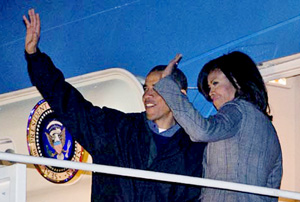Washington, Jan 24: US President Barack Obama today embarked on his highly anticipated three-day landmark trip to India during which the two countries will strive to make progress on climate change, defense and economic cooperation.
Obama left by Air Force One, the presidential aircraft, from the Andrews Air Force Base.
The President is accompanied by a sizeable delegation that will include several top officials, as well as First Lady Michelle Obama. Obama is travelling to India at the invitation of Prime Minister Narendra Modi.
The Presidential aircraft will have a brief refuelling halt at Ramstein in Germany and will touch down in Delhi at 10 am on Sunday at Air Force Station, Palam.
The President, who is making his second visit to India, will be joined there by multiple members of his Cabinet, influential business leaders and a host of US lawmakers, including Nancy Pelosi, the minority leader of the US House of Representatives.
On his arrival, Obama will be accorded a ceremonial welcome at about 12 noon at the majestic Rashtrapati Bhawan by President Pranab Mukherjee and Prime Minister Narendra Modi.
Thereafter, he will pay homage to Mahatma Gandhi at the Rajghat and participate in a tree planting event there.
Obama will then join Modi for a restricted working lunch at the Hyderabad House and participate in a "walk and talk" with the Indian Prime Minister there, the White House said.
The two leaders will then have an expanded delegation level meeting, which is expected to last for about an hour.
Later in the evening, Obama is scheduled to meet US embassy personnel and families at ITC Maurya Hotel. He will then drive down to Rashtrapati Bhawan to attend the state banquet hosted by President Mukherjee.
On January 26, Obama will participate in the Republic Day celebration as the chief guest along with the First Lady. Later, the Obamas will attend a 'At Home' reception hosted by President Mukherjee at Rashtrapati Bhawan.
In the afternoon, Obama and Modi will participate in a CEO forum roundtable and make remarks at a US-India Business Summit.
On January 27 morning, the US President will give an address at Siri Fort Auditorium and then leave for Saudi Arabia. He has cancelled his much-publicised visit to Agra to see the Taj Mahal.
Obama will travel to Riyadh in order to pay respects to King Salman bin Abdulaziz and the family of the late King Abdullah bin Abdulaziz.





Comments
Add new comment